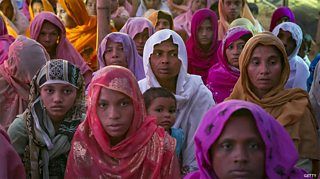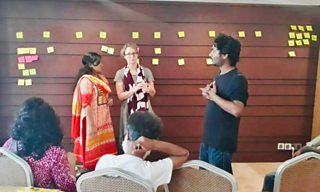Hear Me Too: a drama to tackle violence against Rohingya women in Cox鈥檚 Bazar
Sarah Bradshaw
Training Manager, 主播大秀 Academy International
Tagged with:
For , we hear first-hand from Sarah Bradshaw, Training Manager for 主播大秀 Academy International and experienced radio producer/director. Sarah worked with our teams in Bangladesh to develop a new radio drama to change attitudes towards gender-based violence.

Rohingya women in Cox's Bazar, Bangladesh
Sarah:
The first thing I hear in the refugee camp is, “Rohingya women can do anything, I can do anything.”
Ayesha, about 60, shows us into her makeshift home with grace and warmth. My 主播大秀 Media Action colleagues and I sit on the beaten earth floor of her plastic hut dwelling. We’re in one of the biggest refugee camps in the world: Kutupalong, just outside Cox’s Bazar in southern Bangladesh.
Her welcome is impressive and humbling. She has her baby grandson in her arms. His mother and father are conspicuous by their absence. We don’t ask where they are.
Four writers, a drama director and I are in the camp to talk to any of the Rohingya refugees kind enough to give us their time. But unlike so many of the journalists and NGO workers present, we’re not here to talk about their recent traumatic experiences, instead we want to know about life in the camp and how they’re coping now.
Earlier in the year, the Norwegian Ministry of Foreign Affairs granted funding to and 主播大秀 Media Action to create a radio drama for Rohingya communities, specifically to help women and girls. As the project’s radio drama consultant, I’m here to help shape the production team’s ideas into a 20-episode synopsis.
Listening to real women’s stories
主播大秀 Media Action often uses drama as a way to approach sensitive issues, and one of them is what NGOs call Gender-Based Violence, or GBV. This laudably non-judgmental expression is new to me and I can see the advantage of its neutrality. This term respects cultural practices, whereas terms such as ‘wife beating’, ‘sexual assault’ or ‘grievous bodily harm’ could be seen as pejorative and risk shutting down conversations around the issue. By understanding the experiences of Rohingya women and girls, and exploring them openly, this new radio drama has the opportunity to help address sexual violence and abuse.
Back in the office, my Media Action colleagues presented their excellent new research into GBV among the Rohingya community in Cox’s Bazar. It revealed that many Rohingya women experience forms of GBV such as child marriage, intimate partner violence and sexual abuse. In the context of a poorly-lit, overcrowded camp, the risks intensify. This research is an invaluable resource, providing accurate evidence which the team can consult when trying out new plot lines.

Sarah and the Bangladesh Team developing storylines for the radio drama
Changing the story
We know that character-led, long form drama has the power to shift opinions, and the hope is that this serial will subtly increase knowledge around GBV through stories with which both men and women can empathise. This drama, created specifically for the Rohingya crisis, will also inform people about the support services available to them in the camp.
But perhaps the drama’s true power is presenting the flip-side, illustrating the largely untapped potential of women and girls.
So the team and I got down to the job of sticking plot lines to the wall, creating the stories for each character over 20 episodes. The writing and directing team were used to working for screen, so I ran a couple of workshops on the relationship between radio scriptwriting and sound effects. The team tried out their draft scripts with their backs turned to the actors – the test was whether they could ‘see’ in their mind’s eye what was physically happening in the scene and which character was talking.
And the production team aren’t alone, the Rohingya audience is unused to radio drama too. One of the challenges is to ensure that the audience understand that the episodes aren’t a real, fly-on-the-wall documentary, but fiction.
Entertaining and informing
The refugees in Kutupalong have little to do and face an uncertain future in their new home of Bangladesh. A drama that could entertain and distract a bored and traumatised people, even for a moment, must be useful. But crucially, it also has the potential to get them talking, asking wider questions around their situation: it could be massive.
Back in the camp, Ayesha walks us up the hill on which her hut is precariously perched. Together, we look out over the vast camp, past the trees and the water to Myanmar. 主播大秀.
Perhaps it might come as a surprise to the menfolk in her community to hear Ayesha talk to us so fluently, confidently, proudly about her skills as a net maker. So we have given her a voice – basing one of our characters on her.
After all she can do anything.
--
Sarah Bradshaw has worked for 主播大秀 Radio Drama as a producer, director and writer. She’s also worked as a consultant for 主播大秀 Media Action’s very own Life in Lulu.
Our new radio drama for Rohingya communities is currently in piloting and is due to air in Cox’s Bazar in early 2019. To find out more about how we’re responding to the Rohingya crisis and how listening to those affected informs our work, take a look at .
If you’d like to learn more about how drama can be an effective tool for tackling sensitive issues such as gender-based violence, you might like to read written by our Executive Director, Caroline Nursey, last year.
